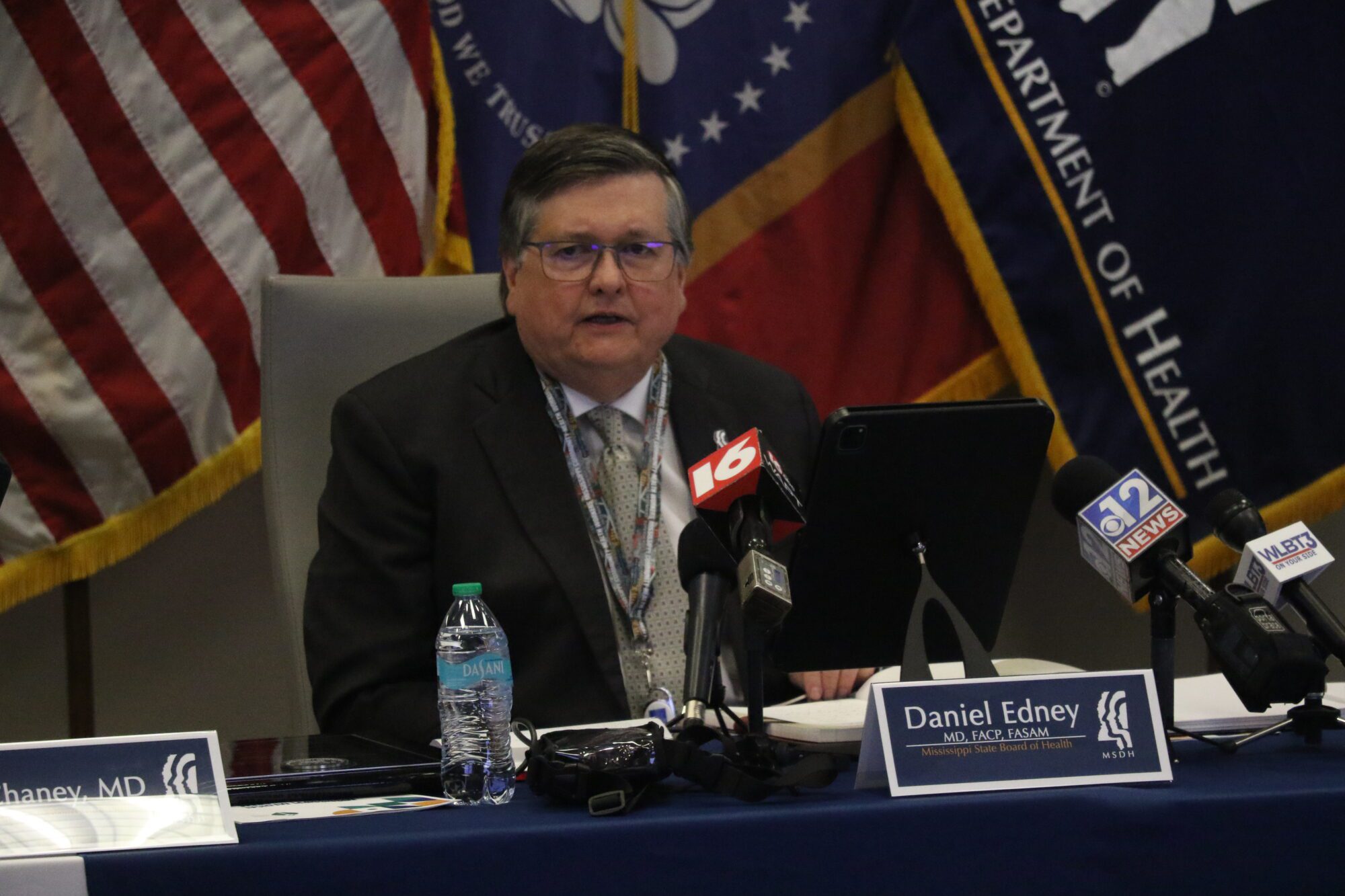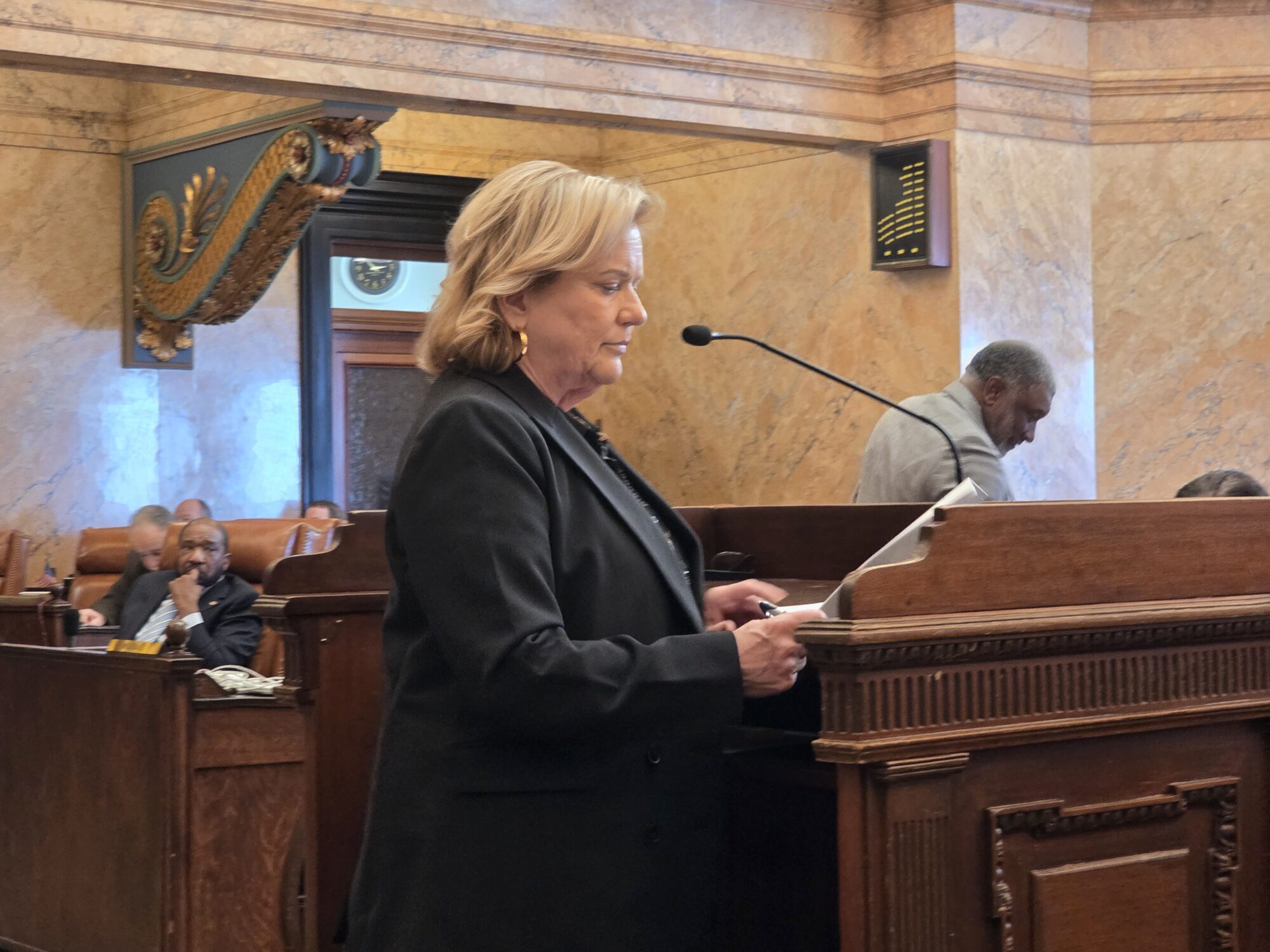State Dept. of Health approves changes to certain CON requirements, details seasonal infections

State Health Officer Dr. Daniel Edney addresses the Mississippi State Department of Health during Wednesday's meeting - January 2025. (Photo by Jeremy Pittari | Magnolia Tribune)
- State Health Officer Dr. Daniel Edney provided the department updates in during a Mississippi State Board of Health meeting this week.
Increasing rates of whooping cough and other seasonal ailments, along with reducing the need for a Certificate of Need in three categories were discussed during Wednesday’s Mississippi State Board of Health meeting.
Seasonal infections
Dr. Daniel Edney, the State Health Officer, described how rates of pertussis, commonly known as whooping cough, are on the rise nationally. The vaccine-preventable infection is affecting children in Mississippi as well. Edney said that while the state’s rate of infection is in line with the national average, it is an area of concern.
Last year, the Health Department also noted an increased rate of West Nile infections and, subsequently, deaths. In response, Dr. Edney suggested the state ramp up efforts to mitigate mosquito populations.
As the cold and flu season in 2025, Dr. Edney noted that the state is seeing an increase in respiratory diseases, including Respiratory Syncytial Virus, which has resulted in some pediatric deaths.
“Respiratory season is in full swing,” Edney said. “We are definitely encouraging those who are eligible for vaccination and passive immunity to receive that.”
Dr. Edney also described a new test and treatment program offered at local health departments.
“I do want to make sure that the public is aware, that y’all are aware, that part of our influenza response is to provide a new test to treat program,” Edney described. “So, we’re not just testing at the county health departments, we’re testing and treating for those who are uninsured.”
Cases of COVID are also ticking up as the cold grips the South, but Edney said rates are not reaching the levels seen last year and are not impacting capacity limits of local hospitals so far.
In addition, bird flu, or H5N1, has impacted chicken flocks in the state. The State Health Officer added that the Department of Health was working with the Department of Agriculture to address the issue. In response, the Department of Agriculture ordered two counties to depopulate infected flocks. About a week ago, seven workers at affected locations became symptomatic but were found to be infected with a respiratory disease that was not H5N1.
Addressing other health-related issues
To address addiction in the state, the Mississippi Opioid and Substance Use Disorder program has seen some success, now reaching almost 400 patients. The program is offered at the county health departments and via telehealth to those who qualify.
“These are patients that do not have access otherwise,” Dr. Edney explained. “They not only are seen for free, but their medications are shipped from the pharmacies to them at no cost.”
To help increase the state’s overall health, Edney said he is working with State Superintendent Dr. Lance Evans to develop a program that will work with public schools to educate children about healthy choices.
Dr. Edney said the proposal does not entail more health classes but rather will be incorporated as part of the school day. The goal is to educate children on preventable causes of death.
“We absolutely need to successfully educate our children,” Edney said. “Our children need to be healthier, but we need them to be healthy when they’re 38, we need them to be healthy when they’re 57.”
Opening up further options for care
To address maternal health in the state, the Maternal Mortality Review Committee submitted recommendations concerning obstetrics care in the state as part of a report submitted in November.
The approved recommendation included adopting an OB system of care concept.
“This will move us more toward national standards,” said Dr. Edney. “It will facilitate transfers from rural areas to higher levels of care. Our goal is for high-risk pregnancies, those moms who are stable for transfer, to be transferred and deliver at a birthing hospital.”
Three recommendations were also approved by the Department of Health concerning Certificates of Need. Those included removing the capital expenditure limit, eliminating CONs for outpatient hospitals providing inpatient dialysis treatment, and supporting CON exemptions for rural hospitals that provide 24/7 acute care services.
Lawmakers in the 2025 session are likely to take up other options to reduce restrictions on care caused by CON laws. However, specific legislation has not yet been filed as the session only started this week.











